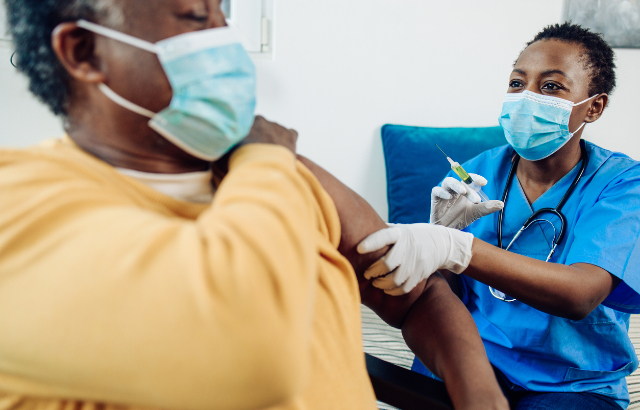Multiple factors contribute to COVID-19 vaccine hesitancy among older, ethnic minorities
A new study involving Queen Mary University of London suggests patient-related factors, healthcare providers, health systems and policy may facilitate access or barriers to vaccination.

Man being vaccinated.
Older adults from minority ethnic backgrounds are at increased risk of contracting and dying from COVID-19, yet vaccine hesitancy is high amongst individuals from minority ethnic backgrounds. The barriers towards and facilitators of vaccination among older, ethnic minority individuals are not well studied.
The study published in PLOS Medicine identifies thirteen factors influencing vaccine uptake among older, ethnic minority individuals. To better understand the key factors influencing COVID-19 vaccination status, researchers conducted a systematic review of 28 published studies on vaccine uptake within minority communities around the world. The researchers then conducted a synthesized content analysis, grouping data into themes falling into three predetermined structural determinants of COVID-19 vaccination status: 1) healthcare provider and system related; 2) patient-related; 3) policy and operational level.
Barriers to vaccination
The researchers were able to identify 13 different themes related to vaccine uptake. Some themes summarised barriers to vaccination, such as misinformation or personal beliefs, while other themes outlined factors facilitating access, such as vaccination reminders from healthcare providers.
The article found that older people from ethnic minority backgrounds were less likely to be vaccinated if they did not know about the vaccination programme, distrusted the healthcare system or if the getting the vaccination was expensive or required transport. The research also showed that people were more likely to be vaccinated especially if recommendations were made by family members, cultural leaders or healthcare professionals, and if they understood how the vaccine worked.
Dr Dipesh Gopal, NIHR In-Practice Fellow in Primary Care at Queen Mary, said: “During the pandemic, many people saw viral videos on COVID-19 and vaccinations being sent through WhatsApp groups and social networks. A lot were spreading disinformation and not representative of up-to-date scientific evidence. For those of us from ethnic minority backgrounds we were worried about our uncles, aunts, parents and grandparents who received confusing messages. As researchers we were keen to find out what influenced vaccine uptake for older people from ethnic minority backgrounds.”
“We hope that our study paves the way for new studies especially in countries with older people from ethnic minorities, such as the UK, as well as new interventions to improve vaccine uptake in this group of people. This would help ensure that many more people can be protected from infections in general, and in future pandemics."
Dr Cini Bhanu, Clinical Research Fellow at UCL, adds: “Vaccination uptake amongst older adults from minority ethnic backgrounds can be supported through a multi-level approach – including increased education, access and culturally competent discussions with trusted healthcare professionals to address health beliefs. Such measures can maximize the potential impact of widespread vaccination policies.”
Future research
The study was limited in that most publications reported on influenza and pneumococcal vaccines, not COVID-19, and most were based in the USA with a minority from Japan, Brazil and Hong Kong and one multinational study from the UK.
As the researchers did not review COVID-19 specific studies, future research is needed to understand whether vaccine mandates facilitate COVID-19 vaccine uptake among minority communities.
More information
- Research publication: Bhanu C, Gopal DP, Walters K, Chaudhry UAR (2021) Vaccination uptake amongst older adults from minority ethnic backgrounds: A systematic review. PLoS Med 18(11): e1003826. https://doi.org/10.1371/journal.pmed.1003826.
- Read Queen Mary author Dr Dipesh Gopal’s blog on the paper: How do we improve vaccine uptake in older adults from ethnic minorities?
Related items
For media information, contact:
Sophie McLachlanFaculty Communications Manager (Science and Engineering)
email: sophie.mclachlan@qmul.ac.uk


